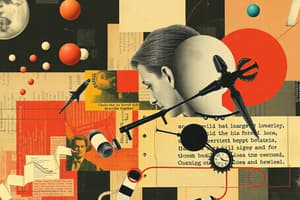Podcast
Questions and Answers
What distinguishes pharmacology from pharmacy?
What distinguishes pharmacology from pharmacy?
- Pharmacy includes drug mechanisms.
- Pharmacy is concerned with drug administration. (correct)
- Pharmacology focuses on drug regulations.
- Pharmacology only studies the history of drugs.
Which of the following best defines a drug?
Which of the following best defines a drug?
- Chemical substances that produce biological effects. (correct)
- Only medications prescribed by a doctor.
- Natural remedies used in traditional medicine.
- Any substance that can alter body functions.
What historical document is known for early pharmacological practices?
What historical document is known for early pharmacological practices?
- De Materia Medica.
- Ebers Papyrus. (correct)
- The Pharmacopeia of the United States.
- Hippocratic Corpus.
Who emphasized the importance of structured experimentation in drug action?
Who emphasized the importance of structured experimentation in drug action?
What significant shift occurred in pharmacology over time?
What significant shift occurred in pharmacology over time?
Which figure is noted for publishing 'Outline of Pharmacology'?
Which figure is noted for publishing 'Outline of Pharmacology'?
What role does chemistry play in pharmacology?
What role does chemistry play in pharmacology?
The term 'medicines' refers specifically to what?
The term 'medicines' refers specifically to what?
Which ancient practice involved inhaling herbs for medicinal purposes?
Which ancient practice involved inhaling herbs for medicinal purposes?
What characterizes the early development of pharmacology?
What characterizes the early development of pharmacology?
What role does pain serve in the human body?
What role does pain serve in the human body?
What ancient civilization is noted for using opium for pain relief?
What ancient civilization is noted for using opium for pain relief?
Who first isolated morphine from opium?
Who first isolated morphine from opium?
What was morphine commonly referred to through its association with the Greek god?
What was morphine commonly referred to through its association with the Greek god?
Which device significantly increased the potency and risk of addiction to morphine?
Which device significantly increased the potency and risk of addiction to morphine?
What is diacetylmorphine better known as?
What is diacetylmorphine better known as?
What mischaracterization was made regarding heroin when it was first marketed?
What mischaracterization was made regarding heroin when it was first marketed?
Which of these accurately describes a challenge in understanding pain management?
Which of these accurately describes a challenge in understanding pain management?
What has been a key takeaway from the evolution of pharmacology?
What has been a key takeaway from the evolution of pharmacology?
What legacy does opium hold in modern medicine?
What legacy does opium hold in modern medicine?
Flashcards
Pharmacology
Pharmacology
The study of how drugs affect living systems.
Pharmacy
Pharmacy
Deals with drug regulations, prescriptions, and administration.
Drug
Drug
A chemical substance with a known structure that produces biological effects.
Medicine
Medicine
Signup and view all the flashcards
Ebers Papyrus
Ebers Papyrus
Signup and view all the flashcards
De Materia Medica
De Materia Medica
Signup and view all the flashcards
Rudolf Boeheim
Rudolf Boeheim
Signup and view all the flashcards
Oswald Schmiedeberg
Oswald Schmiedeberg
Signup and view all the flashcards
Shift from Anecdotal Remedies
Shift from Anecdotal Remedies
Signup and view all the flashcards
Interdisciplinary nature of Pharmacology
Interdisciplinary nature of Pharmacology
Signup and view all the flashcards
Pain as a Warning Signal
Pain as a Warning Signal
Signup and view all the flashcards
Early Pain Treatments
Early Pain Treatments
Signup and view all the flashcards
Opium's Ancient Use
Opium's Ancient Use
Signup and view all the flashcards
Morphine: The Active Ingredient
Morphine: The Active Ingredient
Signup and view all the flashcards
Morphine's Drawbacks
Morphine's Drawbacks
Signup and view all the flashcards
Hypodermic Needle's Impact
Hypodermic Needle's Impact
Signup and view all the flashcards
Heroin: A Synthetic Derivative
Heroin: A Synthetic Derivative
Signup and view all the flashcards
Drug Targets: Receptors
Drug Targets: Receptors
Signup and view all the flashcards
Understanding Drug Mechanisms
Understanding Drug Mechanisms
Signup and view all the flashcards
Pharmacology's Evolution
Pharmacology's Evolution
Signup and view all the flashcards
Study Notes
Pharmacology Introduction
- Definition: The study of drug effects on living systems.
- Pharmacology vs. Pharmacy: Pharmacology focuses on drug mechanisms and effects, whilst pharmacy focuses on drug regulations, prescriptions, and administration.
- Key Concepts:
- Drugs are chemical substances with known structures that produce biological effects.
- Drugs exclude nutrients and dietary essentials.
- Medicines contain drugs plus stabilizers, buffers, flavorings, etc. Drugs are the active ingredients in medicines.
Pharmacology Development
- Origins: Dates back to the mid-1800s.
- Early Stages: Initially primitive and random.
- Modern Pharmacology: Now experimental, data-driven, and precise.
- Interdisciplinary Nature:
- Chemistry: Understanding drug structures and interactions.
- Physiology: Understanding body function in health and disease.
Historical Evolution of Pain Management
- Pathology: Identifying disease mechanisms.
- Ancient Practices:
- Early references: Ebers Papyrus (1550 BC).
- Practices like inhaling herbs for asthma, prune mixtures for constipation, and trial-and-error treatments for cancer.
- Roman and Greek Contributions:
- Dioscorides (40–90 AD) compiled the first pharmacopoeia ("De Materia Medica").
Transition to Modern Pharmacology
- Key Figures:
- Rudolf Boeheim: Emphasized drug "mode of action" and developed structured experimentation.
- Oswald Schmiedeberg: Published an "Outline of Pharmacology" and distinguished roles of pharmacologists and clinicians.
- Progression: Shifted from anecdotal remedies to mechanism-based, evidence-driven science.
Understanding Pain, Opium, and Morphine
- Understanding Pain: Acts as a warning signal for tissue damage and historically tied to spiritual beliefs.
- Primitive Approaches: Included spells, bleeding, purging, and scalding painful areas.
- Opium in Ancient Medicine: Derived from the opium poppy sap, used since 4000 BC for pain relief, inducing sleep, and euthanasia.
- Key Developments (Opium and Morphine):
- Friedrich Sertürner (1804): Isolated morphine (active ingredient in opium) and named it after the Greek god of dreams.
- Morphine characteristics: Potent analgesic but highly addictive.
- Issues: Led to "soldier's disease" (morphine addiction during the American Civil War).
- Advancements: Introduced the hypodermic needle and increased intravenous drug delivery, increasing morphine potency and addiction risks.
Emergence of Heroin
- Diacetylmorphine (Heroin): Semi-synthetic derivative of morphine. Marketed as a non-addictive substitute by Bayer, but turned out to be highly addictive.
Understanding Drug Mechanisms
- Drug Targets: Receptors bind hormones or neurotransmitters, enzymes catalyze biochemical reactions, ion channels regulate ion flow across membranes, and carriers transport molecules across cell membranes.
- Challenges: Limited understanding of pain communication pathways and exact drug binding targets like morphine.
Key Takeaways
- Pharmacology Evolution: From random remedies to a systematic and controlled discipline.
- Opium's Legacy: Foundation of modern analgesics but a cautionary tale about addiction.
- Future Outlook: Continued exploration of drug mechanisms and improved understanding of pain.
Studying That Suits You
Use AI to generate personalized quizzes and flashcards to suit your learning preferences.



